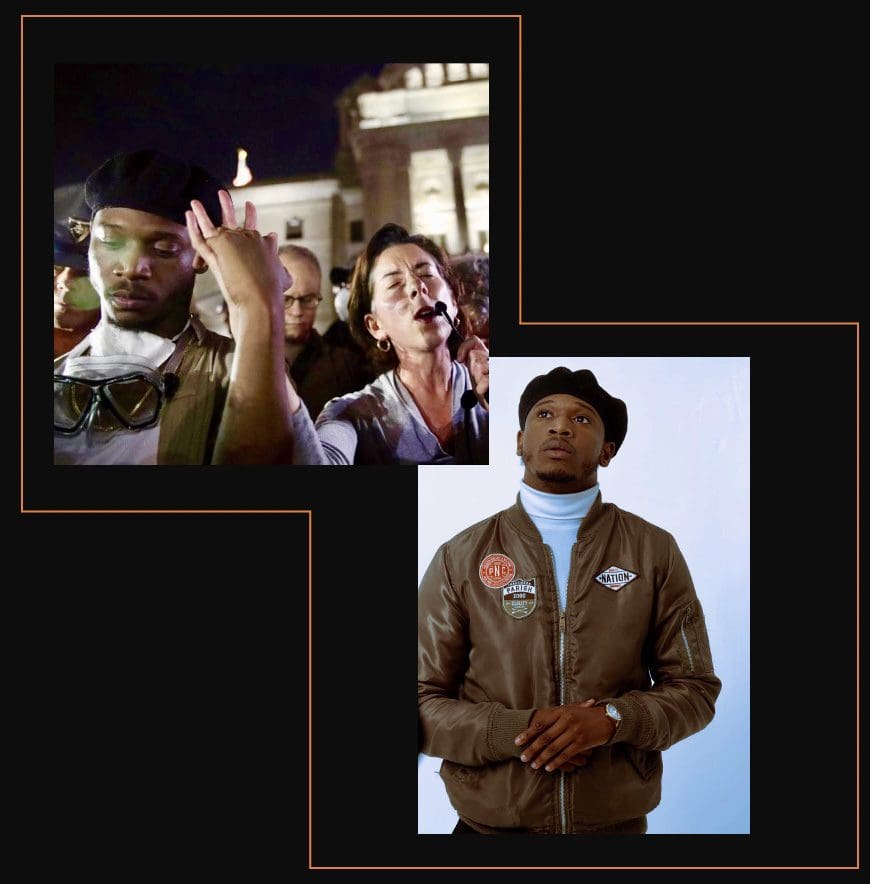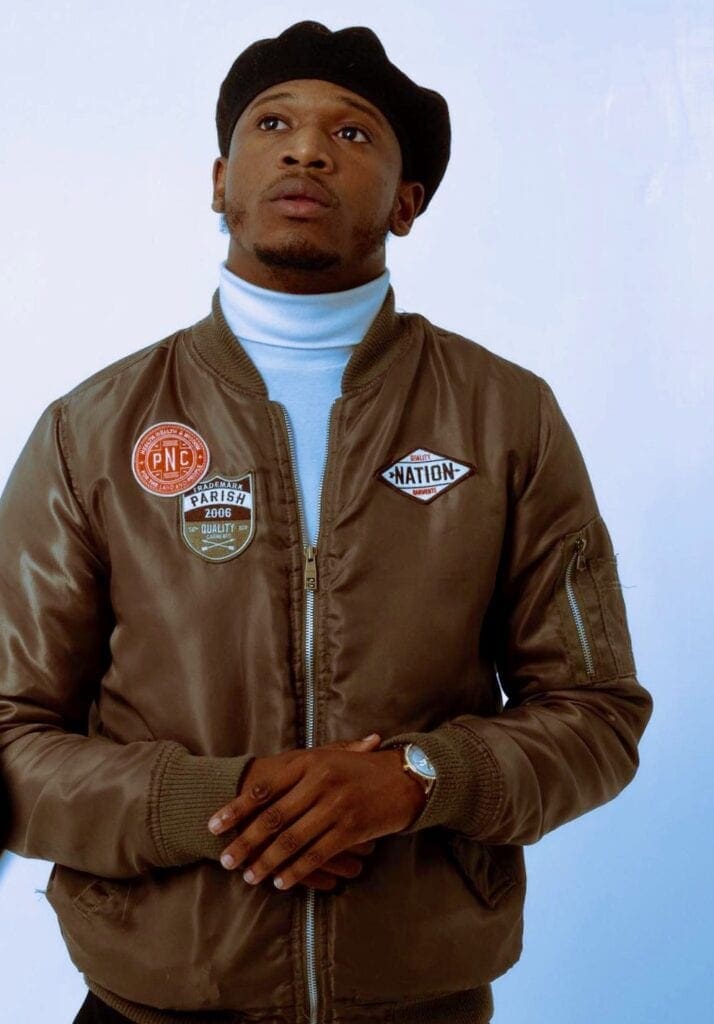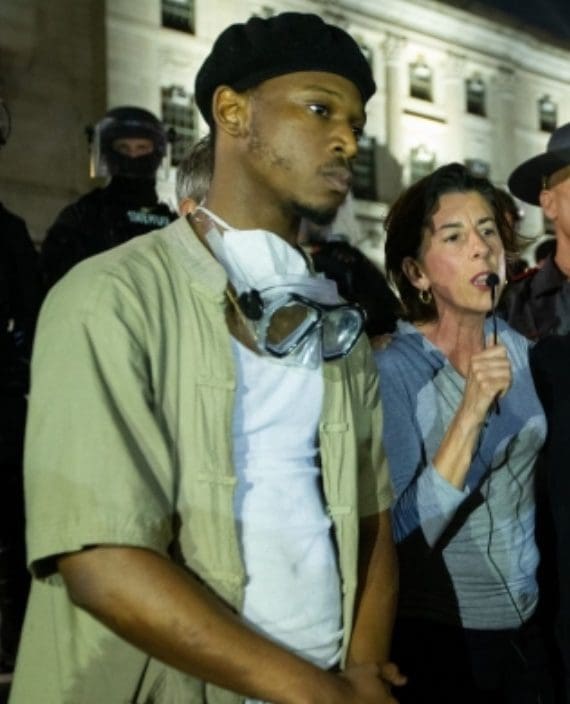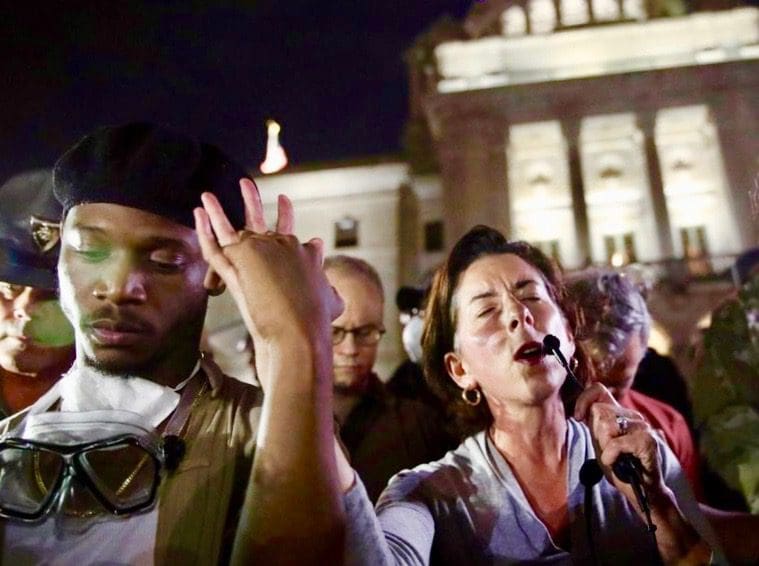Search Posts
Recent Posts
- RI Veterans: Did you know? 25.04.24 (100th for Louis Dolce, events, resources) – John A. Cianci April 25, 2024
- Business Beat: Bad Mouth Bikes takes home 3 national awards April 25, 2024
- Rhode Island Weather for April 25, 2024 – John Donnelly April 25, 2024
- We Cook! Mill’s Tavern’s Cajun North Atlantic Swordfish, Mango Salsa, Cilantro Citrus Aioli April 25, 2024
- The Light Foundation & RI DEM’s 4th Annual Mentored Youth Turkey Hunt a success April 25, 2024
Categories
Subscribe!
Thanks for subscribing! Please check your email for further instructions.

TOP STORY: “We are not enslaved – there are not chains on my arms” – Meeting Bradley Souffrant
by Nancy Thomas
Top Story: We feature the top story of the week. This week it was our profile interview with Bradley Souffrant.
He’s complicated. That’s a white person’s description.
You might recognize him as the young man on the steps of the RI State House, holding hands with the Governor of Rhode Island, Gina Raimondo. Standing close to her on the night of June 5th with dozens of law enforcement at their back, and facing hundreds of demonstrators with as serious a look on his face as the moment called for. A curfew time encroaching. An enforcement action looming. A moment in time. It could go either way. And much of the way it would go depended on this petite Governor and a strong Black man clasped to her side.
Who is this man?

RINewsToday found him. His name is Bradley Souffrant. And, if this white journalist could use one word it would be “complicated” to describe him. An appropriate word too, as the world is about as complicated these days as it has ever been. But never more so than for Black men, women, and children. If I could choose another few words, I’d choose these – hope – strength – smart – mature – centered – calm. But hope would be my favorite, and it surrounds the way he picks his carefully chosen words.
After some investigation, I found Bradley and he was gracious enough to talk to me for well over an hour. I can’t begin to capture everything that needed to be captured in this far-ranging conversation. I simply didn’t have the depth that I unexpectedly needed to have to talk deeply, to feel deeply, what Bradley so easily communicated about living as a Black man.
His words are simple, plainly stated. Almost a soundbite in every phrase. They come slowly. With consideration. With serious thought. And substance. I try to marry them with the activists’ chants in an unsuccessful search for understanding of the words that come from most who seek change today.
Bradley’s holistic world.
Bradley, of Haitian descent, is a serious guy. Even when talking about a large Haitian family, he will say that “It’s cool to celebrate, but let’s find ways to come together to elevate”. His life’s experience belies his age. A member of the Millennial/Gen Z cusp, he grew up in Brockton, Massachusetts. A few years ago, at the young age of 19, he ran for Mayor of Brockton. He knows one day he will run for something again. He’s already looking for that opportunity. He expresses the discipline it took for him to put some distance between himself and the tight community where everyone knows him by moving to Providence in 2020.
Today, at 23, he is the founder of YICK – Young Inner City Kids. He works in the Brockton schools where he helps young people in middle/high school “learn about themselves”. Some of his work includes helping young people “love what they see in the mirror” and reinforces the concepts of the Law of Attraction. He approaches them knowing that for many of the young people he meets, college will not be in their future, so he talks about “how to build your credit” and different options to take other than college. He’d like to see all schools adopt a vocational option, with little of this accessible to young people in the southeastern Massachusetts community at this time.
He recognizes the lack of male role models and he tries to serve as a motivational role model in the community, willing to work with young people, many of whom see protesting as their “community”. About protests that turn violent, Bradley says, “you all need to stop confusing revolt with riot”.
At the RI State House
The conversation about engaging youth and helping to direct them into a more positive future leads us back to how he came to be on the steps of the RI State House with Governor Raimondo. He had been living in Brockton at the time but had participated in Black Lives Matter protests in that city, and also traveled a few days earlier to Boston, and found himself this June night here, in support of Providence’s event. He usually takes a bullhorn with him to raise his voice in the crowd, though he says he was not involved in any leadership way with the Providence demonstration. “I’m myself, and often people will look to me as a natural leader in the group; I’m not sure why.” He seems to accept the role as a responsible gift.
That night protesters were a mixed group of people. Some Black Lives Matter from Rhode Island or other cities, some local high school groups, other groups, and even families. There was an announced curfew to prevent a peaceful demonstration from turning violent, as often happens late at night, but as the group approached the steps of the RI State House at around 7pm, there was no sign that they would be adhering to it. Bradley found himself at the front of this group. It was about 15 minutes before the 8pm curfew when a law enforcement official approached him and asked for his help. He quietly told him that “at 8pm everyone is going to get arrested”, and he asked for Bradley’s help with the crowd, bringing him up the steps. Bradley started to speak to them through the bullhorn about the curfew, trying to motivate them to leave, and for the first time at any protest he had participated in, he got booed by the crowd. His voice goes very soft talking about when that happened, and one could imagine his reaction standing in a familiar and comfortable leadership role, and then being booed by his peers. He started to go up to everyone individually and debated the leaders to back up off of the steps to create a healthy distance between the police and citizens. After debating, he got the most stubborn ones who wouldn’t budge, listening, and he was able to get everyone off the steps.
At this point the Governor had made her way to the front of the steps next to the State Police and RI National Guard. Bradley found himself holding her hand. Another Black protester held her other hand. They took what looked like protective positions on both sides of her. Law enforcement stood by behind them. Everyone was close together at a powder keg moment. The Governor shouted her pleas for them to disband at the crowd below her.
“While she was speaking, they were yelling,” Bradley said, as he did his best to show solidarity that this was as far as the group could safely go, and they should listen, and deescalate a potential for violence. This went on for about a half an hour. The Governor kept saying to the people that they were being heard: “I hear you. I promise change will come.”
Then, in an unexpected action, the Governor asked the protesters to pray with her. Now Bradley and the Governor entwined their fingers. It was an historical moment that is sure to have national recognition in the future among any Governor in any state, in this year of protests.
The crowd took a while but decided to leave the State House steps. What occurred later that night will also be memorable for the state and for Providence as destruction and looting took place when the peaceful crowd were joined by other people intent on anarchy over a peaceful social justice demonstration.

Scream. Or get involved.
Bradley talks about change a lot. And the responsibility Black people have to find their role both collectively and individually. “You can scream all you want – or you can get involved”. Many people at protests don’t vote, he says. American government is a democratic process. They use words – intellect – to get change. In other countries, they use the military and violence to bring about change. Black people don’t think about putting words on paper, necessarily – “actions will speak louder for me” they think.
“In America we want to direct people’s emotions, and we need institutions that stop blaming the victim for the reaction. People are willing to sit down but we’ve been sitting down for a long time. It’s wrong to think that in order for you to live the American dream, you have to live the American nightmare. Our people are easily led astray. Easily influenced. Easily distracted. I want to say, ‘We are not enslaved – there are not chains on my arms.’ I want independence. But my whole life has taught me how to be dependent. We have to change the paradigm of the way our people think.”
“Youth don’t wake up and say, ok, I’m going to do THIS today – this is my plan – they don’t have a plan. We need to help people organize their minds [and lives]. We need more psychologists in the schools, more therapists. Restorative justice. The police do not stop crime. They arrive after crime is committed. Society breeds drug dealers, with a double-edged sword of dependence and incarceration. Students should not be arrested, and we need to use restorative justice practices and get rid of the merit system in schools that was there since I was in school.”
Bradley sees hope over the years. In the five years since the Brockton High School walk-out in 2015 there has been a 100% improvement. We don’t suspend students anymore.”
Elections
“Today, we’re not voting for fact, we’re voting for emotion. We need to deplug, unplug, and reimagine our future. What does it look like – to be independent – for ourselves? We view ourselves the way our oppressors view us – and that’s the issue. People tell me, Bradley, you have to play the game.”
“We still scared. We still don’t believe in ourselves, enough to get freedom. We have a lot of slave mentality that we [use to] reinforce the fact that we need to remain dependent.”
Watch two videos from Bradley, here:
Bradley often takes to impromptu videos to reach others with his messages – these two stand out.
https://www.facebook.com/bradley.souffrant/videos/3962999490396676/ https://www.facebook.com/bradley.souffrant/videos/3963068713723087/

